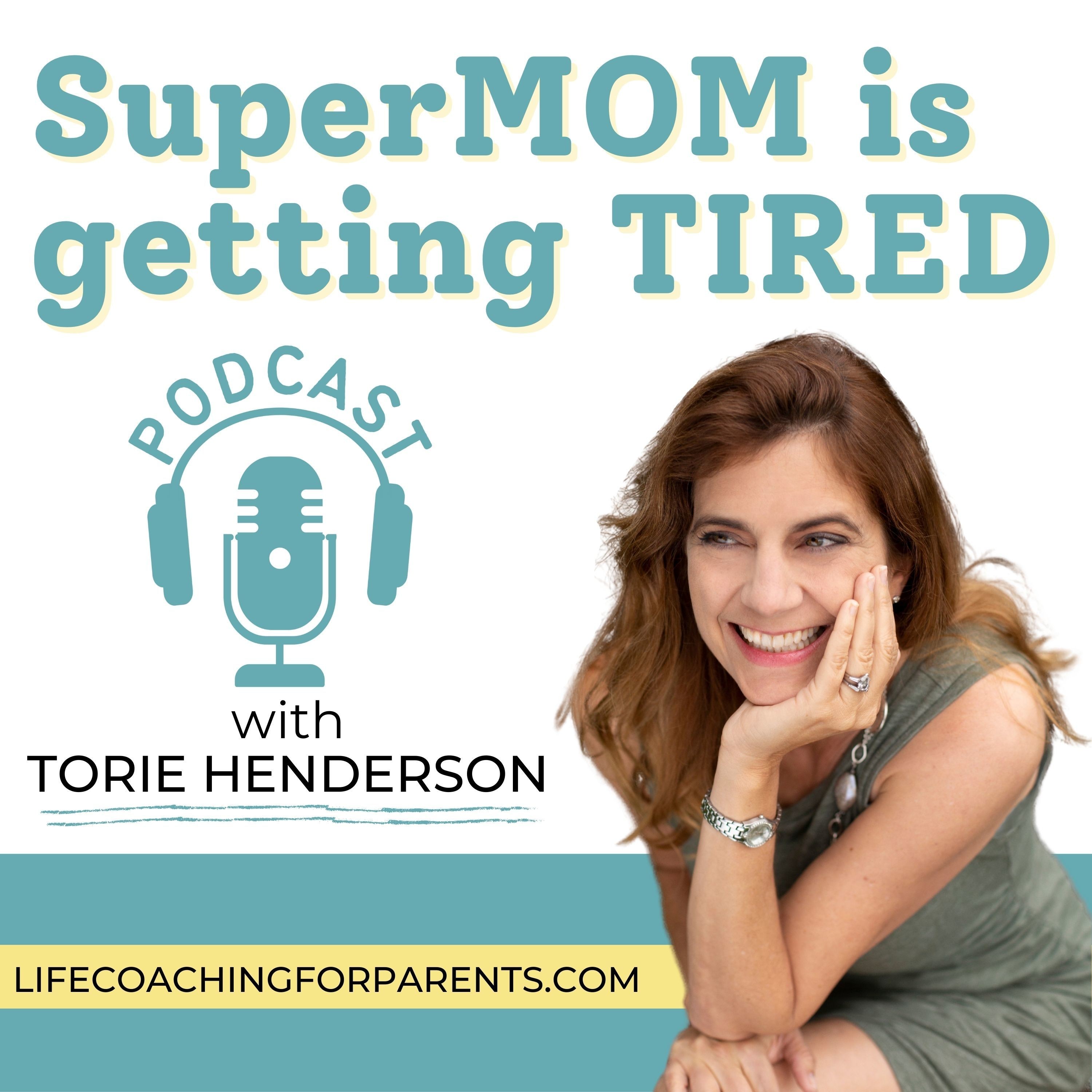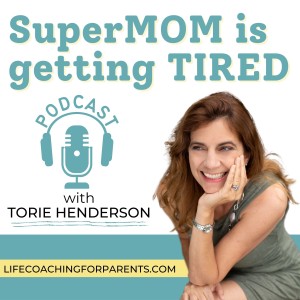
75K
Downloads
173
Episodes
You love being a mom but get overwhelmed, lost and resentful by all the parenting responsibilities. Listen as life coach, teacher and parent educator, Torie Henderson, answers common parenting dilemmas from hard working Supermoms. Are you exhausted from working hard all day but still feel like you haven’t accomplished anything? Do you want to feel calm, energized and in control? Then this podcast is for you.
Episodes

Tuesday Feb 27, 2024
Enneagram Type 5 – The Investigator
Tuesday Feb 27, 2024
Tuesday Feb 27, 2024
The Enneagram Type 5, often referred to as "The Investigator" or "The Observer," is known for their thirst for knowledge, a desire to understand, and a tendency towards introspection and solitude.
These perceptive, cerebral problem solvers are intensely curious and love to delve into topics that interest them. 5’s are lifelong learners and enjoy acquiring expertise in areas that captivate their intellect.

Type 5s value their independence and autonomy. They are introspective by nature and need solitude to recharge and reflect on their thoughts and ideas.
Type 5s tend to be reserved and observant in social situations. They prefer to listen and observe as they gather information and analyze their surroundings. When they do speak, their words are well thought out presenting fully formed ideas.
Type 5 individuals excel at strategic thinking and problem-solving. They have a knack for seeing patterns and connections, which enables them to come up with innovative solutions to complex problems.
Imagine we all wake up everyday with our battery fully charged at 100%. Throughout the day, work, kids, chores, arguing and traffic can drain our energy so that by bedtime we are at 0%. Enneagram type 5's start the day with their battery charged at 20% and being out in the world drains it quickly so they need to retreat in order to charge it up again. This makes fives keep involvement with others to a minimum. Small talk, sharing feelings and socializing can feel like an intrusion making relationships challenging.
It’s not uncommon for reserved Type 5s to adopt a minimalist lifestyle. They prefer to keep their life simple so that there are fewer demands on their time, energy and attention.
Core Fear: being incompetent, incapable, or ignorant. They fear being overwhelmed by the demands of the world and not having the resources to navigate it successfully.
Core Belief: They must protect themselves from the demands of the world by accumulating knowledge and minimizing their needs. They believe that by being self-sufficient and intellectually competent, they can avoid feeling overwhelmed or vulnerable.
Core Motivation: Want to possess knowledge, to understand the environment, to have everything figured out as a way of defending the self from threats from the environment.
Ahn came up to me after I spoke at a parenting conference wanting to make sure she was setting her kids up for a successful future. She moved to the U.S. to give her kids the best opportunities and had been reading parenting books and attending conferences to learn more about U.S. parenting culture.
Ahn had taken an intellectual approach to parenting, diving deep into educational theories, child and brain development. She provided her kids a stable home environment and kept the peace with her gentle demeanor.
Because it was clear she was meeting all of her kids’ intellectual needs, I decided to take a “whole brain approach” with her. I talked about how the school her kids went to emphasized left brain skills but where she could supplement at home were the right brain skills.
She was hungry to learn more so I talked about engineering companies were complaining that the kids coming to work for them had plenty of education but not enough real life experience. Kids today weren’t doing enough tinkering in the backyard, building things, jumping off things, playing with rocks, water and sand. The businesses of today were noticing that this lack of playful experimentation had negative career consequences down the road.
She was practically salivating! She had a park down the road from her home that she had never taken her kids to because she thought it was a waste of time!
I talked about other right brain skills: empathy, art, storytelling, play, and how she could help her kids develop their right brains at home while they worked on their left brains at school. I suggested the Daniel Pink book “Why Right Brain Thinkers are Going to Rule the Future.” and I felt so happy that I could give Ahn’s kids a happier childhood by being able to speak the language of the enneagram 5.
Questions to determine if you might be a Type 5:
1. Do I minimize my exposure to the outside world to conserve energy?
2. Do I prefer accumulating knowledge and information over material possessions, clothes, or symbols of status?
3. When a situation gets emotional, intense or overwhelming, do I disconnect from my feelings in the moment and then reconnect with them later, at a time and place of your choice? (or become anxious because these feelings were suppressed?)
Behind Fives’ relentless pursuit of knowledge are deep insecurities about their ability to function successfully in the world. Fives feel that they do not have an ability to do things as well as others. But rather than engage directly with activities that might bolster their confidence, Fives “take a step back” into their minds where they feel more capable. Their belief is that from the safety of their minds they will eventually figure out how to do things—and one day rejoin the world.
The intense focus of Fives can thus lead to remarkable discoveries and innovations, but when the personality is more fixated, it can also create self-defeating problems. This is because their focus of attention unwittingly serves to distract them from their most pressing practical problems. Whatever the sources of their anxieties may be—relationships, lack of physical strength, inability to gain employment, and so forth—average Fives tend not to deal with these issues. Rather, they find something else to do that will make them feel more competent.
Struggles Enneagram Type 5’s may encounter as parents:
Emotional Availability: Type 5 parents may struggle to express emotions openly and provide the emotional support and validation that children need. They may prioritize intellectual engagement over emotional connection, which could lead to difficulties in nurturing their children's emotional development.
Need for Space and Solitude: Type 5 parents value their alone time and may require significant periods of solitude to recharge and pursue their interests. Balancing the need for personal space with the demands of parenting, which often involve constant interaction and engagement, can be challenging for Type 5 parents.
Difficulty with Spontaneity: Type 5s tend to prefer structure and predictability in their lives. They may struggle with the spontaneous and unpredictable nature of children, finding it challenging to adapt to the ever-changing demands and needs of parenting.
Overemphasis on Independence: Type 5 parents may be ready for their kids to grow up and become self sufficient, long before the kids are ready to do so. While independence is important, it's also crucial for children to feel supported and nurtured as they navigate the world.
Anxiety: 5’s tend to have very busy brains and are prone to ruminating, overthinking and mental spinning. Their slow external pace can hide a hyper anxious mind and the suppressing of emotions and ignoring the body exacerbates this anxiety.
What 5’s use life coaching for:
1. To understand and connect with their children.
2. To focus on time management and accomplishing goals.
3. To reduce anxiety and find tools for relaxing the nervous system.
4. To help them take breaks from parenting.
Monique came to life coaching in, what I call, “zombie mommy mode”. She was going through the motions of her life without feeling fully present, alive or connected. She didn’t know what was wrong, the hamster wheel she ran on everyday kept her family on autopilot. She had the job, the house, and the family life she wanted, but she felt lost.
Once we figured out she was an enneagram 5, it was easy to see what was missing. Monique needed alone time and she needed delve into learning something new.
It started with taking a day to herself to explore the city. She wandered through museums, spending as much time as she wanted at each exhibit without listening to complaining kids. It was HEAVEN for her. When Monique came home, her husband and kids noticed a marked difference in her demeanor. She seemed happier, more relaxed, like her old self. Her husband suggested she take a whole weekend away next time, and she did.
She signed up for a free walking tour, diving into the history of the city. She relished the quiet evenings to herself. She enjoyed a two hour breakfast where she actually got to READ the whole NEWSPAPER before visiting some of the city's historical landmarks.
These weekends gave her the quiet time she needed to fill up her cup, get a break from the noise, chaos and clutter at home, and devote time to her favorite activity, learning.
Other enneagram types worry about what people will think if they take breaks away from this kids, but fives don’t care about that. These thoughtful, self sufficient investigators like to maximize their mental abilities, avoid taking risks and value integrity over social acceptance.
Small action steps 5’s can take today feel like a more balanced and peaceful parent:
1. Focus on making decisions and accomplishing tasks.
Notice when you are getting intensely involved in projects that do not necessarily support your self-esteem, confidence, or life situation. It is possible to follow many different fascinating subjects, games, and pastimes, but they can become huge distractions from what you know you really need to do. Decisive action will bring more confidence than learning more facts or acquiring more unrelated skills.
2. Use physical activity to get out of mental spirals.
Fives tend to be extremely intense and so high-strung that find it difficult to relax and unwind. Make an effort to learn to calm down in a healthy way, without drugs or alcohol. Exercising or using biofeedback techniques will help channel some of your tremendous nervous energy. Meditation, jogging, yoga, and dancing are especially helpful for your type.
3. Learn active listening.
Living with children means living with emotional beings. Try repeating what you hear them say. Paraphrasing their thoughts and feelings will help your kids feel heard, seen and felt.It also gives your brain something to do and builds a close connection without having to empathize with all their emotions.


No comments yet. Be the first to say something!